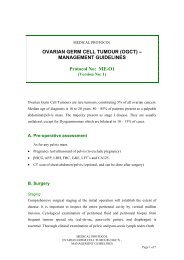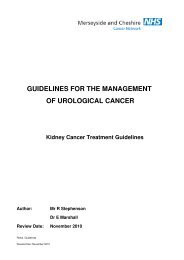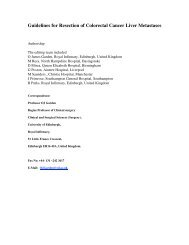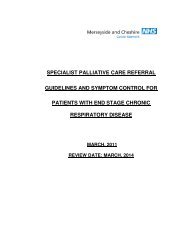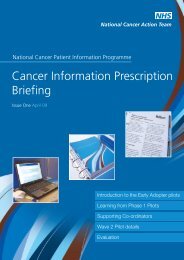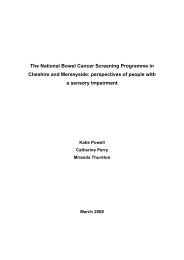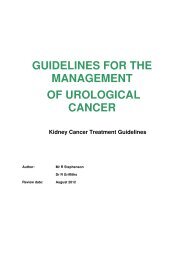Cancer Reform Strategy - NHS Cancer Screening Programmes
Cancer Reform Strategy - NHS Cancer Screening Programmes
Cancer Reform Strategy - NHS Cancer Screening Programmes
- No tags were found...
Create successful ePaper yourself
Turn your PDF publications into a flip-book with our unique Google optimized e-Paper software.
94 CANCER REFORM STRATEGY●●Ensuring multidisciplinary team working; andProviding more choice in end of life care.7.5 A theme of many of these service models isto provide care outside of hospital settingswhere possible, with efficient access to hospitalservices when necessary. Most cancer patientswant to receive as much of their care as possibleclose to home. However, they also recognisethat they may have to travel to see a specialistteam to receive the highest possible quality ofcare, especially for complex investigations ortreatments.7.6 In all cases, commissioners shouldensure that any satellite services developedoutside hospitals, whether in diagnostics,radiotherapy or chemotherapy, are fullyintegrated with other services within thecancer network. Good links will ensure thehighest standards of clinical governance,standardised protocols and a streamlinedpathway for patients navigating betweenout-of-hospital and hospital care.Access to diagnostics7.7 Several of the expert groups which advisedon this strategy agreed that increasing access todiagnostic tests was an important need incancer services. Diagnostics are important atfour levels:●●●●To help GPs quickly and conveniently excludea cancer diagnosis in people whom theyjudge that the chance is low that theirsymptoms are due to cancer;To ensure that patients with a high chance ofhaving cancer are given the right high-qualityspecialist diagnostic tests to diagnose theircancer quickly;To support the monitoring and managementof cancer patients throughout theirtreatment, for example to assess how atumour is responding to a particulartreatment; andTo detect or exclude recurrence for patientswho are in remission.Increasing access to diagnosticsfrom primary care7.8 As discussed in chapter 3, GPs and primarycare professionals should have quick and easyaccess to relevant diagnostic tests to excludecancer in patients at low risk.7.9 GPs have for many years had direct accessto blood tests and to simple imaging tests suchas chest x-rays. In some parts of the country GPsnow have access, subject to agreed protocols, toa much wider range of diagnostic tests whichcan help to confirm or exclude cancer. Theseinclude:●●●●Endoscopy services;Non-obstetric ultrasound;CT scanning; andMRI.7.10 Increasing use of independent diagnosticsproviders has helped improve capacity for MRI,with approximately 90,000 scans per anumbeing provided to <strong>NHS</strong> patients by AllianceMedical through the term of the MRI fastrackcontract.7.11 However, timely access to such services isnot universal. Patients who would benefit frominvestigation may either not be investigated atall or may be referred to secondary care just toget an investigation done. As a result patientsare almost certainly under investigated forcancer, but over-referred. Under investigationcan lead to delayed diagnosis with catastrophicresults for individual patients.7.12 A good Primary Care Trust (PCT)will wish to ensure that primary careprofessionals have appropriate and timelydirect access to diagnostic tests. They maywish to take account of good practicerecommendations developed by the RoyalColleges of Radiologists and GeneralPractitioners. 46 The PCT will also wish toconsider whether these diagnostic facilitiesshould be provided in acute generalhospitals or in community settings.



